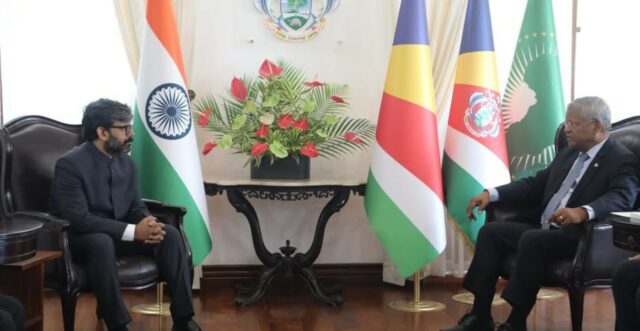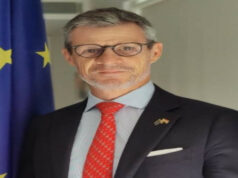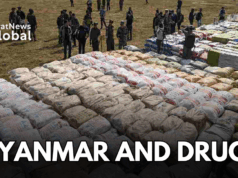
The 2025 presidential elections in Seychelles have entered a decisive phase, with results now forcing a runoff between the leading contenders. For Seychelles’ external partners—particularly India—the outcome holds significant implications for security cooperation, developmental engagement and the evolving balance of influence among competing powers in the Indian Ocean. As the second round approaches, New Delhi must assess how best to safeguard its interests while remaining sensitive to Seychelles’ sovereignty and developmental aspirations.
Seychelles Presidential Election: Second Round
The first round of presidential elections, held between 25–27 September, 2025, has confirmed that no candidate secured the 50 per cent threshold required for outright victory. This paves the way for a runoff between the two leading aspirants. Incumbent President Wavel Ramkalawan, leader of Linyon Demokratik Seselwa Party, who unseated Danny Faure of the United Seychelles Party in 2020, remains in contention but faces a strong challenge from Patrick Herminie, leader of the United Seychelles party.
The contest in the second round will be between Ramkalawan and Herminie who bagged 46.4 and 48.8 percentage of the vote share respectively in the first round. While Ramkalawan emphasises governance reforms and touts an anti-corruption drive, Herminie has revived some of the nationalist developmental narratives rooted in the policies of past leaders like France-Albert René and Danny Faure.
The fragmented vote has opened possibilities for realignments. In the first round, two other notable candidates included Alain St Ange, a seasoned tourism executive and former minister with ties to Faure, and Ahmed Afif, representing new voices seeking reforms. Potentially, Alain St Ange’s voter base—largely overlapping with Faure loyalists—could gravitate toward Herminie in the runoff, giving him a critical edge.
India’s Stakes In Election Result
India has historically shared deep political and cultural connections with Seychelles. These date back to the anti-colonial struggle and the period of de-colonisation that followed. The close ties were visible most dramatically during the mid-1980s when Prime Minister Rajiv Gandhi lent his aircraft from Harare (where he was attending the Non Aligned Movement summit) to help President France Albert René return urgently to Mahe (Port Victoria) to quash a coup attempt.
At various junctures after Seychelles’ independence, Indian support quietly helped stabilise the islands against challenges to political order. In the decades since, Indian-origin communities in Seychelles have remained active contributors to commerce, administration and local culture, cementing people-to-people links.
Successive Indian governments have also maintained steady diplomatic engagement through the High Commission in Victoria, which has played a vital role in coordinating development assistance, scholarships and technical help. As the elections steer toward a second round, India’s stakes are both strategic and reputational.
A Ramkalawan victory could mean continuity in bilateral ties, but lingering distrust and his past posturing over the Assumption Island project complicates matters. Herminie’s ascent, on the other hand, may reopen the conversation on security partnership — albeit under new, mutually acceptable terms. For New Delhi, the challenge lies in staying invested while signaling respect for Seychelles’ sensitivities about sovereignty and external influence.
The Growing Importance Of Seychelles
Under Prime Minister Narendra Modi, India articulated its SAGAR doctrine in 2015 (during Modi’s official tour to Seychelles and Mauritius) and reframed it under the MAHASAGAR concept early this year, again in Mauritius. Both visions emphasise inclusive regional security and maritime cooperation.
Seychelles holds a special position in this matrix. Geographically, the archipelago sits astride key sea lanes linking the Western Indian Ocean with broader global trade. It is proximate to important waterways like the Mozambique Channel and close enough to monitor maritime activities extending to the Gulf of Aden. This makes Seychelles critical for deterring piracy, countering narcotics trafficking and ensuring freedom of navigation.
Diplomatically, Seychelles is both a littoral state and a pivotal member of groupings such as the African Union, Southern Africa Developmental Community, Indian Ocean Commission and the Small Island Developing States (SIDS). Ensuring close relations allows India to act as a partner linking African and Indo-Pacific security concerns, while advancing its claim as a net security provider or preferred security partner.
Strategic Imperatives Of Seychelles
As a SIDS nation, Seychelles combines vulnerabilities with strategic strengths. Climate change, rising sea levels, high dependence on tourism and limited natural resources are issues in its development agenda. Yet it commands an Exclusive Economic Zone (EEZ) of nearly 1.4 million square kilometres. This EEZ gives Seychelles leverage over fisheries, seabed resources and maritime routes, making its future tied to harnessing of its blue economy.
Increasingly, Seychelles has become the object of geopolitical courting by larger powers. The United States, looking for new Indian Ocean access after the UK-Mauritius agreement on Chagos, has widened its footprint and influence. France retains historic ties based on its territories in the western Indian Ocean. The UAE and Qatar wield financial influence, with the controversial leasing of Assumption Island to a Qatari company exemplifying how Gulf capital intersects with sovereignty issues. Meanwhile, China has stepped up aid, including grants for new infrastructure, security assets and healthcare initiatives, signaling intent to build long-term clout. For India, Seychelles represents both an opportunity and a test case: if New Delhi can build trust without fueling perceptions of overreach, it can secure a durable security-development partnership in the Indian Ocean.
Seychelles’ Development Needs
Despite middle-income status, Seychelles requires ongoing development support across critical sectors. India has responded consistently, extending assistance in housing, renewable energy, digital connectivity and healthcare (especially vaccine diplomacy during the Covid-19 pandemic). Notable contributions include the gifting of medicines during health crises, scholarships for Seychellois students and concessional loans for infrastructure. Symbolically, India has remained a reliable partner during lean periods. The tradition of an Indian Navy vessel calling at Port Victoria during Seychelles’ Independence Day celebrations underscores continuity of trust and friendship through decades. For whichever candidate wins the runoff, sustaining development while diversifying external partnerships will be a priority. This gives India the chance to project itself as a non-intrusive partner invested in Seychellois resilience.
The Importance Of Security Cooperation
Security cooperation remains the bedrock of bilateral relations. India has consistently provided patrol vessels, gifted a coastal radar system and offered training for the Seychelles People’s Defence Forces. Maritime domain awareness, information sharing, technical cooperation and joint counter-narcotics and counter-piracy operations have also drawn Seychelles into cooperative frameworks with India, alongside regional navies. However, security cooperation has not been devoid of friction.
The Assumption Island project, originally conceptualised under President Danny Faure, sought to develop infrastructure for Seychelles Coast Guard with Indian support. Ramkalawan’s rejection of this initiative stemmed from concerns that it resembled a military base. Matters grew more complicated with reports that the same island was later leased to a Qatari company, raising questions about strategic consistency.
The next administration will need to balance domestic sensitivities with external security requirements. If Herminie—who has worked with former President Faure—wins, there may be room to revisit the agreement in a restructured form, with emphasis on civilian or dual-use infrastructure to support blue economy and marine safety goals rather than serving military ends.
India’s Long-Term Options
Looking beyond the election cycle, India must hedge its options in Seychelles carefully. If Ramkalawan returns for a second term, continuity in bilateral ties will coexist with prevailing constraints. India will need to avoid pushing overt military projects and instead strengthen people-centric initiatives such as climate resilience, renewable energy, digital platforms and tourism revival. A gradualist approach in maritime cooperation—without pressing for permanent facilities—will help rebuild trust. If Herminie wins, New Delhi may find an opportunity to reset the priorities. A recalibrated plan to develop facilities for Seychelles Coast Guard, sans overt military framing and cast as a civil capacity building project, could gain traction. Moreover, Herminie’s base within the Faure network may enable more pragmatic security dialogues, especially if Alain St Ange voters consolidate behind him in the run-off.
Conclusion
The 2025 presidential runoff in Seychelles, pitting Ramkalawan against Herminie after a fragmented first round, is about more than domestic politics. It is a test for how small island states navigate pressures of sovereignty, development and great power competition while balancing their domestic priorities. India may find an opening to revive structured security partnerships, provided it frames its approach in alignment with Seychellois development needs. In the end, New Delhi’s ability to adapt with patience, foresight and sensitivity will determine whether Seychelles continues as one of its closest Indian Ocean partners or drifts toward other suitors. With the U.S. pivoting stronger into the western Indian Ocean post-Chagos, China experimenting with aid push and Gulf states leveraging financial clout, Seychelles will remain crowded geography. India’s success depends on projecting itself not as a hegemon but as a steady, trustworthy partner.




